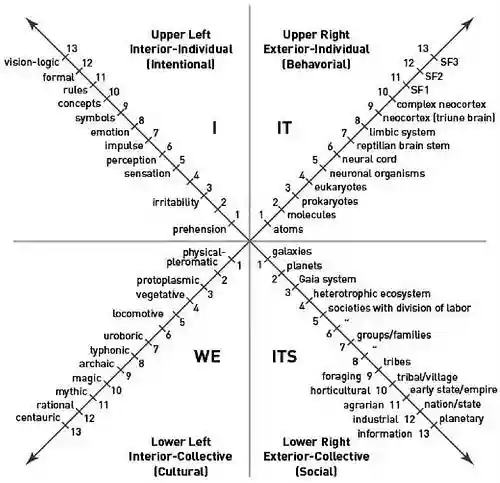You and your computer
Most people only have a basic intuition with how they interface with technology (see ipad babies) and choose to not develop this interfacing with technology any further than what is basically necessary. The boomer generation, who still relied on pre-IT practices, had little need for IT development, so office tasks were generally sufficient for them. “Computer programming” about 30 years ago was still niche and limited in scope to sectors of high technical industry. Since that’s no longer the case, and as we go farther into the future, the more the need to aknowledge rises in how we recognize the relationship technology actually plays in our lives as humans (compared to simply dismissing its existence or embracing every aspect head on). The more infantile you are with your technical understanding, the less control you have, which is obvious, but even how and by what medium you’re reading this on implies a certain mode you’re more likely to be in due to mental conditioning.
This is no more true than with anti-tech counter-cultures, who rebel against all things tech-like with the assumption that being technically handicapped is a sort of honorable affirmation of their ethos, rather than a showcase of how far up the slippery slope they’ve ascended. Unfortunately for them, sticking their heads in the sand by removing all social media from their devices won’t make the tech disappear, it rather tightens the grip that unintentional and obtrusive tech does.

Being tech handicapped in the current world actually just enslaves you more to technology, at best, often with additives of social engineering along with it.
Even if you’re not a part of the global economic system, you aren’t an insular unit that can deject themselves from your wider social circles without consequence. Even if by the extremely rare chance that you genuinely are so self sufficient and can cut yourself off from significant portions of the outter world, you’d face some interesting issues with mental health, but let’s say you’re an average person with more or less average experiences and you decide that a rejection of high-tech is the way to go. Readers of this will probably already understand why one might want to do that, but what could you lose out on with this kind of thinking?
-
You’ll be highly unrelatable. I touched on a previous post about how global pop cultures are becoming more and more synchronized. Even if you don’t talk pop culture, you’ll be severely out of touch with any talking points be it current events, technology (surprisingly a big one), entertainment, medicine…
-
Your job prospects are going to be pretty dim and you’ll likely be outcompeted nearly in every dimension, even ones that aren’t strictly ’technological’ because despite many boomers being slow and zoomers having fish-like attention spans, they do have the uncanny ability to access yottabytes of video tutorials about anything they want. For most of the ‘productive’ work you’d find, this would more often than not give them an edge. Manual trades without piggying off the back of internet search engines are at a severe disadvantage too.
-
You’ll rely on second degree third party information for most of your life, hardly ever consuming the source material yourself. Most of your wider knowledge will come from physical libraries and book stores or sources that rely on the internet themselves. You certainly don’t have the leisure time for that at the same time as when you’re trying to make it innawoods trying to learn how your house’s water supply system works from a few DIY books. The type of knowledge you’ll be able to access will always be biased by the particular region, so you’re anyways at the whim of geographical displacement to influence your thinking.
-
Everything will stay magic to you, and you are stunned at the disconnect you feel when you can’t square the circle of how much technology is actually ‘ok’ and how much is not.
You in the quadrant
Since you’re not in a vaccum, and you can assume that most people are not under such an ideology (and more often than not are behaviorally at the complete opposite end of the spectrum), what communication you do keep with the outside world will be tinted by the degree of how desperately you ejected from technology. It’s pervaded so much of the collective cultural dimension that if you assume your personal life would be unaffected, you would still need to make all sorts of mental gymnastics to tack on how the rest of your society doesn’t influence you either. St. Ignuciusrides this in stark contrast, and though I’m mostly talking about the average, healthy, well adjusted man, It still stands to know that despite his great work that we all benefit from, he too continues to suffer the consequences of a nosedive into ideology done without holistic perspective.

Richard Stallman’s (RMS) internal values are dogmatic and his work has enabled free software to propagate through into the mainstream. Big applause for the GPL and it’s initial success. GNU/Linux is by far the most used operating system in the world, so his work clearly has and will continue to impact uncountable people, but his particular ideology makes him so unrelatable as a person that he is totally in a world of his own. I have to commend his resolve in sticking to this, but what’s clear is that he dejects the principle of a shared collective experience within people that even may share his likeness. He goes into autistic meltdown when he can’t reconcile the differences between what his work was intended for and what others think and do with it. It’s a rejection of the concept that a creation takes a spirit of its own, mirrored to you then not only by your individual experience of it, but each experience individually, the collective personification of it, and as well the collective behavioral output of it.
RMS of course doesn’t reject technology, he rejects external behavioral fit for his individual while disregarding the collective behavioral position, even among his peers in favor of staying as consistent as possible to his ideology which enables him to live ‘freely’. It’s an Aurelian trait and commendable to be sure, but for the mortal man with an average IQ and average mental health? You’re not free if you can’t get medical attention when you refuse to sign off on a hospital note that allows them to retain your data; there’s at least not as much autonomy or freedom in the case of death. In RMS’ case, he’s only aware of a vague aura of the ominosity of societal technology and chooses to exercise his control by choosing things which limit his behavior, effectively maiming his ability to control his environment. He isn’t in control of travel, organization, coordination, or sustaining himself because he doesn’t live in a vacuum. Nevertheless he had the liberty to choose this, the same can’t be said for those who detach completely from the issue.
Ignoring this relationship with technology doesn’t automatically place you in some camp of ideology, but it’s a mistake to imagine that whatever degree you choose doesn’t affect your life.
I get the impression that many of the ‘off the grid’ types in the western world are just larping for the cultural aesthetic without consideration for the specifics of their ideology. This happens without their explicit inclusion in the participation of the tech-sphere. It impotently tries to signal a level of automony in that they have willpower to fight against easy dopamine and societal collapse, but the outcome is entierly reactive and thus easy to manipulate and control. A remarkably few people world-wide actually live totally off-grid by choice (and many of them love charging their smartphone at the desk in an internet cafe while having a cigarette, which i’m sure is not the aesthetic the larpers had in mind).
You and your intuition
I’m not saying you shouldn’t curtail the amount of technology you allow in your life either. The lack of discipline in regards to how much hedonistic pleasure you allow yourself is of course vital, but more particular the type of interaction you allow yourself to have with technology.
No meaningful research or pursuit has been done on a smartphone besides a cursory query to attempt to prove something in a social situation
Simply how you physically operate with 1st line computing is probably the most important habit forming device in relation to how adjusted you are to the world we found ourselves in. Do you allow your phone in bed and use social media as your central point of reference to the world? Do you use a computer with some default news and shopping search bars plastered all over? How long does it take you to do anything? People know about adblockers and assume the worst of social engineering is simply the type of ads you receive.
The worst type of social engineering is derivative of workflow engineering
How much of a given task you want to accomplish, and how much influences you away from that. Even if you can obstensibly remove external distractions from your environment, how seamless are your interactions to the point where you’re able to be fully in sync with what you’re controlling? A touchscreen itself is undoubtedbly the most intuitive input method we’ve ever implemented in technology, and as such it’s just an input method which allows for a seamless link between what you’re experiencing and what you’re controlling, but the psychology someone assumes on a touchscreen device is modulated by what interactions you can expect to happen, and who/what controls them. Not from a cosmetic viewpoint or that it’s a pleasurable light-show, but in general most people who use a phone, use it frequently, and for a long time summed throughout the day. To the exclusion of any other computing device. A desktop computer or laptop is hardly much different in top level description, afterall, a smartphone is just a highly restricted computer. Historically they started from vastly different points, but a smartphone since genesis is highly limited in nature being designed as a consumption fix. The exposure to the internet is limited by UX design to the average user, influencing them to common behavioral sinks. So the touchscreen for the model of pure consumption is perfect, your ability to manipulate that ‘product’ or within it is watered down enough by the input alone, subjecting yourself to mostly chatting or being a low-tier forum shitposter when you take the two farthest away points from pure consumption. You train your brain to be less efficient, and ’normal’ becomes pure consumption.

What’s a computer? Oh that’s easy! It’s for games!
There’s nothing inherently wrong with consumption. Movies, music, games, memes, chating, browsing, shitposting, none of it is bad by definition. It’s just so often over-emphasized as a staple muscle relaxant that it’s become backgrounded at large as the go-to task for a lot of people’s recreational activities. Most people have literally conditioned their brains to the point that for them to relax they must consoom. This is no different than porn addiction or browsing linkedin. If you only use a computer for entertainment then you’re training yourself to abuse one of the greatest known technological advancements and you program that muscle memory into your body. Every time you sit down in front of the computer and do nothing but consume, you’re just warping an ever diminishing drive to create.
The adoption of any technology changes it to be applicable to the lowest common denominator in proportion with its adoption base.
I can’t expect this trend to lessen any time soon, even with counter cultural pressure. I’m not even advocating for a removal of vices, but you can’t forget that they are vices and the ability to abuse them is growing exponentially. Complexity and bloat in software has been growing in parity along with the adoption curve, so cutting down on as much complexity and bloat in a practical way would be necessary in part at least to combat workflow manipulation, but also information overload which in turn helps other aspects of your life holistically. If you want to take control of your technological life, you need to demystify what you’re experiencing and distance yourself from it sensibly such that you’re intentionally operating with it. I don’t necessarily advocate for social media, but the point isn’t to purge all social media and e-content from your life as possible just to maximize yourself. Orienting yourself sanely is the only defense necessary from the pitfalls of technological manipulation, and how you move digitally is paramount to that.
You in a digital body
A professional athlete trains to optimize his movements so that highly sophisticated movements become natural.
Without this kind of training he’ll always fall inferior to his potential. It also has the added effect of helping you stay healthy. In much the same way, if you want to be as productive as possible (or simply sane) when working with computers, you ought to take some of those sensibilities in muscle memory optimization that professional athletes do and apply them to your situation. Afterall, you don’t have an infinite amount of brainpower to use throughout the day, let alone the hour. Wasting collective minutes seem trivial in terms of a full day, but macro environment management adds up when you just want to do the thing you want to do. Without learning how to use your tools efficiently you won’t be able to spend your time doing things which are truly interesting, and if it’s harder to do you’re less likely to do it.
Specific work is often of arguable importance, but workflow is generally not just an easier to define metric (either more or less efficient), but also a key indicator of if what you’re doing at whatever level of abstraction is at least a competent method of doing it. Workflow is both highly context specific and personalized. What is most optimal for someone working in graphic design with 3 fingers on one hand is different than someone in aerodynamics engineering, which will be different than someone working on a compiler.
I observed anecdotally that some of the people that were most productive actually had the most minimal needs. They could reduce their reliance on certain programs to a bare minimum and still end up working faster with more impact, with huge variations in preference for operating systems or environments. This doesn’t mean there wasn’t intentional emphasis placed on their relationship to their computer I/O, often the programs or optimizations are discovered by recommendation, a ‘feeling’, or simply chance. Good workflow doesn’t always necessitate playing the keyboard (like a keyboard).
Look closer and you might notice:
- Minimal but present use of some kind of note-keeping
- Automative configuration (this is where keybinds/shell/ssh/multiplexer configs come in)
- Window management sanity (whether tiling or floating)
- Their goal does not leave their focus, even if it lasts for hours and isn’t visible
The last one is easily the most important in regards to workflow and isn’t something that can be gotten by just tinkering or adding more customization onto your setup. Highly specific steps are taken in order to make that last point at the core of their work, however personalized it might be. The goal is always somewhere in sight, and the ‘how’ is so rehearsed as to be intuitively invisible. They operate at often native fluidity with their input, superior to a touchscreen which because of the modalities of interaction offer greater dominion of your agency. In the previous paragraph I mentioned that this is highly context dependent and personalized. In general, a ‘power user’ in a subset of programs do not make a mental ‘power user’. FOSS software is great for understanding the roots of how things come together technically; you can learn to interoperate within, and it then serves as a gateway to free yourself of the habits of blanket consumption without turning into an ascetic outright.